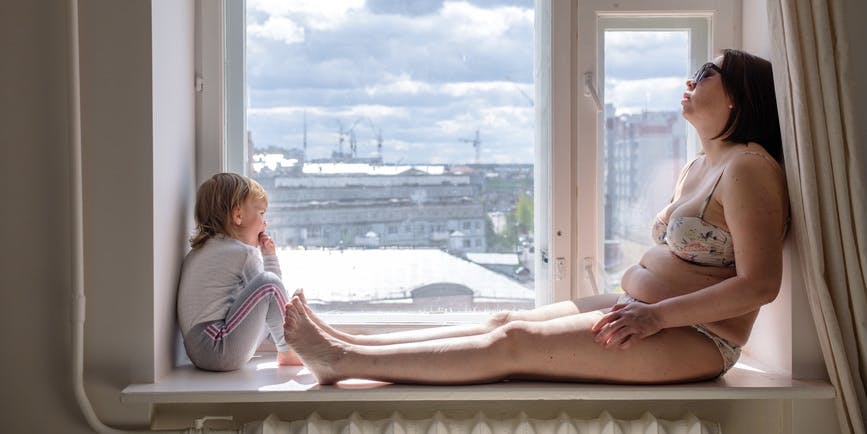How extreme heat affects your health (and what to do about it)

June of 2023 was officially declared the hottest June on record. July is projected to hit similar ranks, too.
So on top of celebrating Disability Pride Month with some excellent Checkup reads, we wanna make sure you know the sneaky ways extreme heat can exacerbate preexisting conditions, mental health + pet health.
Grab a cool drink + a notepad. You can keep cool this summer. We’re here to help.
- The Checkup: cool + beautiful bodies
- Hot Topic: care + calm + cuddles
- Healthcare: ↑ Covid-19 + ER + deaths
The Checkup
- Swimming in the ocean? Don’t drink the (poop) water!
- To prevent heat exhaustion or stroke, don’t do these 8 things
- The Barbie Foot Challenge vs. real-life high arch issues
- Stay cool inside w/ fun + fabulous books by disabled people
- How/why to find an inclusive practice + fat-friendly doctor
- Workplace accommodations need a human-centered approach
- Hydrate up with these 40 refreshing watermelon recipes
- If you like to sweat, try this 30-minute hardcore dance workout
- And if you don’t, get to the pool and try aqua jogging
Heat-triggering conditions

CNET tracks how extreme heat can exacerbate various conditions. Other than staying extra hydrated, here’s the gist of their detailed suggestions. If you have any of the below, make sure to head to the article for tips on how to keep yourself safe for the hot days ahead.
- Autoimmune illnesses. High temperatures, UV light + humidity can trigger the immune response + exacerbate symptoms. Stay as cool as possible + avoid sudden temperature shifts.
- Asthma + COPD. Heat can worsen lung + airway obstruction. Limit physical activity outside + bring medications (like inhalers) everywhere.
- Diabetes. Diabetes can affect how sweat glands cool the body + sunburn can raise blood sugar levels. Keep covered (feet, too), avoid dehydrating caffeine + alcohol and keep insulin cool.
- Eczema, rosacea + acne. Dehydration, sweating + sunlight can trigger flares. Wear loose clothing, use fragrance-free products, shower in cool water, slather on the SPF + keep skin moisturized!
- Heart conditions. Heat can strain the heart. And some heart meds affect the body's cooling response. Limit activities that increase blood pressure + take advantage of hydrating summer produce.
- Pregnancy. Higher heat (+ air pollution) can increase early delivery risk. Do everything you can to keep cool, hydrated and healthfully fed.
Dr. B treats several of the above heat-exacerbated conditions with a $15 online health assessment. Want to get prescription medication online?
Learn more about Dr. B's affordable online health services.
Heat + mental health

As reported in ABC, extremely hot weather can increase acts of violence + suicide rates. But because feeling hot is often an accepted part of summer living, we may not be aware that the heat is causing our altered decision-making process.
What warning signs should we be alter to?
- Common symptoms of heat exhaustion include irritability, frustration, a shorter attention span and diminished cognitive function, like the inability to think or communicate clearly.
- We’re also more likely to have insomnia, which leaves us groggy + less able to make quick decisions. Even if we don't think we're having trouble sleeping because of the heat, we may be more prone to traffic accidents or smaller slip-ups.
- People with established mental health conditions are at increased risk for worsened symptoms. Plus, some medications for mental illness disrupt the body’s ability to cool itself.
Those of lower socioeconomic status are at particular risk for heat exposure, as it may be not possible for them to prioritize the cost of air conditioning or taking a break from spaces or tasks to keep cool. Check in with neighbors and loved ones if you're able, or ask for help if needed!
Pets feel the burn, too!

According to NPR, if it's too hot for you to be outside, it's also too hot for your pets to be outside. Same thing for the car, or an un-airconditioned house, or anywhere else.
This is especially true for older pets, those with dark/thick fur and those with breathing issues (like pugs).
Here's a few tips to keep them safe this summer:
- Watch for signs of heat stroke in pets like anxiety, restlessness, excessive drooling/panting, vomiting, diarrhea, unsteadiness and (in cats) open-mouthed breathing. If you think they have it, take their temperature. If it's 105° or above, cool them down fast by putting them in the shade, helping them drink water or lick ice cubes, running cold water on them, cooling them with ice packs, etc. Stop whem they're around 103°.
- Keep pets inside + hydrated. + never leave them in a car. (Organ failure happens fast.)
- Walk during cooler hours. First feel the pavement with the back of your hand. If too hot, it can burn paws!
- Pets can sunburn. So shaving them (to help them keep cool) can backfire. This is especially true for pets with a double coat (which helps them cool down.) Instead, just keep them out of the sun.
- Give them a water source outside—but not a dog house! Pools, kiddie pools, and hoses are all safe (as long as you're supervising). But dog houses become hot houses—the shade won't help.
Read the article for even more tips + to-do’s.
Healthcare 411
COVID-19 metrics see first increase since January (USNews). Test positivity, wastewater levels + emergency department visits are increasing + hospitalizations have stopped declining. New Omicron variants XBB.2.3 and EG.5. are also on the uptick. This report details the current upward trend.
From rapid cooling body bags to ‘prescriptions’ for AC, doctors prepare for a future of extreme heat (StatNews). If you head to the ER with a heat-related illness, they may put you in an ice-packed body bag! That’s one way emergency physicians treat heat stroke—an area of ER care increasing every decade.
US mortality rates far higher than peer nations, leading to millions of "Missing Americans" (News Medical). Over 1 million Americans die unnecessarily yearly—more than any other wealthy nation. The gap has never been this large. Why? United States citizens have more gun violence, food insecurity + opioid use plus lower vaccination rates + fewer masking protocols.
Sign up for the free Dr. B newsletter for a weekly report on the latest in healthcare + research-based advice for staying healthy and mentally well.